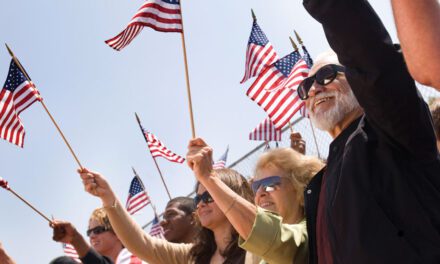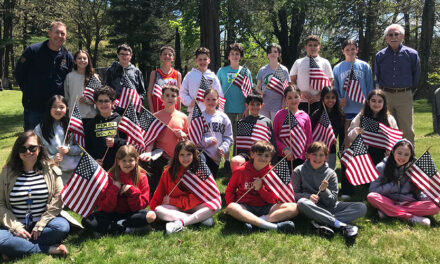Published May 6, 2020
By DAN TOMASELLO

FIVE LYNNFIELD REGISTERED NURSES have been fighting the COVID-19 virus on the frontlines at Boston Medical Center. Front row, from left, Theresa Golden, Jill Damiani and Diane Courtney. Back row, from left, Steve Slaney and Mary Doherty. (Courtesy Photo)
LYNNFIELD —Five Boston Medical Center registered nurses from Lynnfield have joined health care professionals from around the world fighting the COVID-19 virus pandemic.
RN Jill Damiani works in BMC’s Surgical Intensive Care Unit, which is where the most critically ill COVID-19 patients are receiving treatment. The unit’s patients are on ventilators and have been placed on life-saving medical drips.
“I have been in the ICU for quite a few years, and these are some of the sickest patients we have seen,” said Damiani. “It’s very challenging. No matter how hard you work, sometimes nothing changes and sometimes patients just don’t get better. It’s hard to deal with day-in and day-out that they are not getting better even though you have been at their bedside for 12-plus hours. It’s just not what we are used to. It’s not why we went into nursing. We are supposed to help people get better, and we just can’t. It’s very hard.”
RN Theresa Golden works as part of BMC’s Medical Surgical Float Pool, where she helps cover medical surgical units where COVID-19 patients are receiving treatment. She has also been caring for patients in the hospital’s critical care area.
“It has been very challenging,” said Golden. “There are a lot of days where I feel overwhelmed. The patients are very sick. I have been a nurse for 25 years, and I have never experienced anything like this before.”
RN Steve Slaney has been treating adult COVID-19 patients in BMC’s Emergency Department. He said one of the most challenging and daunting aspects of the pandemic is the “fear of the unknown.”
“It’s something we have never battled before and you don’t know what kind of form it’s going to take,” said Slaney. “There are illnesses you don’t expect to be COVID that end up being COVID. We are used to nursing patients back to health and seeing them happy. This is something we have never seen before. We are learning on the fly.”
RN Diane Courtney works in BMC’s Pediatric Emergency Department. She said the department typically provides medical care to children to young adults up to the age of 23.

LYNNFIELD CHILDREN have made supportive signs thanking Boston Medical Center employees for fighting the COVID-19 pandemic. (Courtesy Photo)
“Since there is such a huge burden on the adult-side of the Emergency Department, we are now taking care of patients up to the age of 30, which is a little bit different for pediatric nurses,” said Courtney. “But we are glad we can adapt and make that contribution so that everybody gets great care.”
While RN Mary Doherty’s main role at Boston Medical Center has been providing nursing education and professional development, she has taken on additional responsibilities since the start of the pandemic. In addition to making sure nurses have received up-to-date COVID-19 training, Doherty has been assisting bedside nurses.
“I have been a nurse for a long time, and I have never experienced anything like this,” said Doherty. “We make people better when we normally go in. Usually a patient comes in, gets treated and then goes home. You feel like you have done a good job. But with this, you are working nonstop hour-after-hour and a lot of people are not getting better. It makes you sad.”
Damiani said BMC’s nurses have used a variety of different procedures in order to help the most ill patients get healthy. She said nurses have put patients on their stomachs, called prone positioning, in order to help get oxygen circulating in a person’s lungs. She also said some patients have been put on dialysis because the virus has caused their kidneys to shutdown.
“A severe case is respiratory distress and requires intubation,” Damiani added. “We are putting them on different medications to help them breathe better and if that doesn’t work, we are putting them on their bellies. That has shown it can help patients breathe better. The problem is the virus doesn’t only affect their lungs. They have coagulation issues, so we are seeing people who have clots. That is the part we are having the hardest time with. It’s been hard for the doctors to get a handle on it.”
Doherty said the nurses are seeing “varying degrees” of how COVID-19 impacts patients.
“Some people come in, get admitted, get diagnosed and then be discharged home and remain on quarantine,” said Doherty. “And there are others who have become so sick that they need to be transferred to the ICU.”
Due to the severity of the pandemic, Damiani said hospitals including BMC have prevented family members from visiting their loved ones who have been admitted. She said there have been a number of family members who have been unable to say goodbye to loved ones who have died.
“It’s emotionally very hard,” said Damiani.
Slaney has had similar experiences.
“One of the nurses I was working with was working with a woman in her 80s who spoke another language,” said Slaney. “She was in tears and a bunch of us asked if she was okay. She started crying and said, ‘I feel awful because I had to be there while her daughter said goodbye mom.’ She probably never saw her mom again.”
Courtney said children under the age of 18 are allowed to have one parent in the hospital. She said it has been difficult not having extended family visiting patients.
“We are used to having families support our patients,” she said.
All five nurses said they have not had any issues getting the personal-protective equipment they need.
“We have always felt like we have had the equipment that we needed,” said Courtney. “One of the challenges we have been mindful of is not wasting anything.”
Slaney noted that his wife’s commercial printing company made face masks and face shields for BMC.
“She has donated several face shields for the hospital to use so that we can replace our supplies,” said Slaney. “People from all walks of life have made products in their home.”
Courtney said social distancing measures, the stay-at-home advisory and self-quarantining are making “a huge difference” in the fight against COVID-19.
“I don’t see how would we be able to get this under control without it,” said Courtney.
Damiani said the stay-at-home advisory has helped give her peace of mind knowing her family is safe at home.
“Work is stressful enough right now, and knowing that my husband and my three kids aren’t going anywhere is a relief,” said Damiani. “It’s allowing me to focus on work and do what I have to do.”
Damiani pushed back against lockdown opponents and protesters’ claims that “only the elderly are sick, not that many people are dying and the numbers are inflated.”
“That makes me so angry because people are dying,” said Damiani. “It’s not just the elderly. It’s 29-year-olds and 36-year-olds. I had to tell a 13-year-old that her mother was dead. This virus doesn’t discriminate against anybody. It’s affecting everybody.”
Golden agreed.
“It’s multi-generational,” said Golden.
Doherty said the pandemic has been incredibly stressful for health care professionals.
“You know everyday that you go into work that it’s not going to abruptly end,” said Doherty. “It’s very stressful for the bedside nurses, the physicians and all of the different departments in the hospital. But it has been nice to see people come together, work as a team and support each other.”
Slaney echoed Doherty’s sentiment.
“What we have realized in the hospital is that you appreciate your support staff much more than you have ever have,” said Slaney. “We have housekeepers making minimum wage who are cleaning rooms that have the virus. To me, they are the unsung heroes.”
Doherty said one of the very few bright spots has been seeing COVID-19 patients getting released from BMC. She said the hospital has been playing Journey’s “Don’t Stop Believing” whenever a coronavirus patient is getting discharged.
“And we all clap while they are being released,” said Doherty.
The five nurses said balancing their increasing work demands with their responsibilities at home has been challenging.
“I am still helping the kids with schoolwork and trying to go for a walk to get exercise,” said Doherty. “We are doing all of the things we normally do even though our work burden has become so heavily. You still have to come home and maintain that sense of normal.”
All five nurses said the community has gone above and beyond with the support they have provided them since the pandemic began. Courtney noted a number of Lynnfield children have created signs of encouragement that are on display at BMC.
“It has been so heartwarming because my neighbors who know I am a nurse have been sending care packages, flowers and cookies,” Courtney added. “We have residents volunteering to help make masks. It has been a huge morale boost knowing that people are thinking of you. We live in a very generous community.”
Damiani concurred with Courtney’s point of view.
“I am so grateful for how incredibly generous everybody has been and I am so impressed with how everybody in the hospital has been working together,” said Damiani.
Doherty said the pandemic has inspired her to help other first responders fighting the virus on the frontlines.
“I am trying to pay it forward,” she said. “What really makes a difference is the support from family, friends and the entire town. I think this has changed the way we live and the way we will be living in the future. It’s scary. I pray every night this ends soon.”




